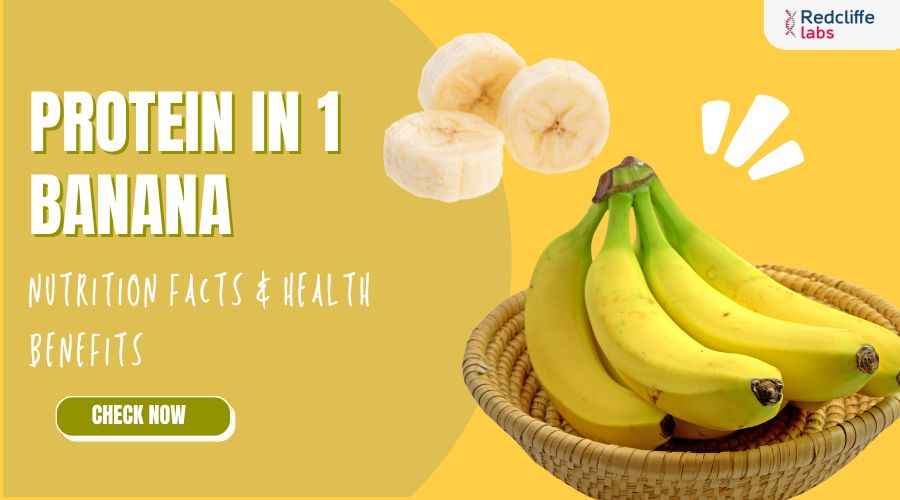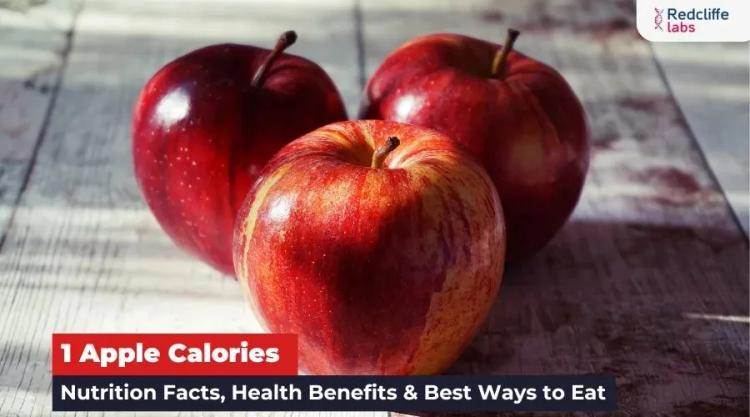Protein in 1 Banana, Nutrition Facts & Health Benefits

Medically Reviewed By
Dr. Geetanjali Gupta
Written By Sheena Mehta
on Aug 24, 2024
Last Edit Made By Sheena Mehta
on Jul 19, 2025

Introduction
Can we give bananas a consumer’s choice award?
Bananas are as popular as apples. If an apple can keep a doctor away, bananas are equally a healthy option for your body. They contain several important nutrients, making bananas highly nutritious. Bananas contain carbs, resistant starch, and fiber, contributing to overall health and well-being.
Would you like to know?
A medium-sized banana of about 118 g contains 105 calories. The other composition of the banana is as follows:
| Carbohydrates | 27 g |
| Sugars | 14.4 g |
| Protein | 1.3 g |
| Potassium | 42, 240 mg |
| Vitamin C | 10.3 mg |
| Magnesium | 31.9 mg |
| Water | 75% |
Did you find anything missing in the nutritional composition of bananas? The fruit is fairly low in protein, under 1.3 grams per medium banana. The protein content in a banana helps you make informed food choices, ensuring your daily protein requirements are fully met.
A single banana contains 1–1.5 grams of protein. However, it depends on the size of the fruit.
Today’s blog is a comprehensive guide that includes the nutritional benefits of bananas, how to incorporate bananas into your daily diet, and their health benefits. So, why wait? Let’s get started.
Also read: https://redcliffelabs.com/myhealth/fruit/banana-kela-health-benefits-nutrition-facts-and-more/
The Nutritional Benefits of 1-medium sized banana (100 g) are:
| Calories | 89 |
| Water | 75% |
| Carbs | 22.8 grams |
| Fiber | 2.6 grams |
| Fat | 0.3 grams |
| Vitamin B6 | 25% of the DV (Daily Value) |
| Vitamin C | 11% of the DV |
| Manganese | 14% of the DV |
| Potassium | 12% of the DV |
| Sugar | 12.2 grams |
| Riboflavin (vitamin B2) | 5% of the DV (Daily Value) |
| Folate | 6% of the DV |
5 Impressive Ways to Incorporate Bananas into Your Diet:
Do you ponder how you can include bananas in your diet? Bananas, or Musa paradisiaca Linn, are excellent sources of potassium, fiber, and vitamin C. Eating bananas correctly can promote a healthy heart, regulate blood pressure, and provide instant energy.
Below are easy, DIY methods for incorporating bananas into your everyday meals and obtaining maximum health benefits.
- A banana protein shake could be a little easier to make. Mix all the ingredients in a blender:
- 2 tablespoons of creamy almond butter
- 1 frozen banana
- 1 tablespoon of unsweetened cocoa powder
- 1 tablespoon of vanilla extract
- 1 cup of plain cow’s or plain soy milk.
Your delicious banana protein shake is ready, which is perfect for breakfast and post-workout fuel.
- Banana protein pancakes are healthier options than regular pancakes. This is because they contain healthier ingredients such as bananas, egg whites, protein powder, and oats. The fluffy pancakes are lower in fat and calories but offer more protein and fiber.
- Banana Bread French Toast is unique and never heard of before. Soak banana bread in a classic French toast batter and fry it. Season your banana bread French toast with chopped walnuts, maple syrup, and sliced bananas for a heavenly experience.
- Banana Greek Yogurt Parfait: Relish a protein-packed parfait. Granola, layer sliced bananas with Greek yogurt, and a drizzle of honey. This super easy recipe is perfect for breakfast or dessert.
- Banana Chia Seeds Pudding: Another creative recipe for enjoying a protein-packed banana is to combine mashed bananas with almond milk, chia seeds, and a small amount of vanilla extract.
This way, you can make creative recipes with bananas, increase your protein intake, and enjoy the nutritional benefits of the fruit.
8 Evidence-Based Health Benefits of Bananas
Bananas, or Musa acuminata, Musa × paradisiaca, and Musa balbisiana. Bananas originated in Southeast Asia, but they are now cultivated in different countries worldwide. They contain a fair amount of potassium and other beneficial nutrients such as vitamin B6, vitamin C, fiber, carbohydrates, niacin, antioxidants, and phytonutrients. This makes bananas a trustworthy choice if you want to add more healthy fruits to your diet.
Let’s discover some of the amazing health benefits of bananas:
- Bananas may improve blood sugar levels: The American Diabetes Association suggests eating bananas as they are rich in fiber that can help lower your blood sugar levels.
- Bananas help maintain good digestive health. A medium-sized banana contains about 10% fiber and 75% water. Together, they encourage regularity and promote digestive health. Bananas are also part of BRAT (bananas, rice, applesauce, and toast). Thus, some doctors recommend eating bananas to treat diarrhea.
- Bananas help preserve memory and boost mood. Tryptophan, an amino acid in bananas, helps improve a person's memory. His ability to remember things becomes better, which also improves his mood.
- Bananas help you feel fuller. According to the 2020–2025 Dietary Guidelines for Americans, over 90% of men and women do not get the recommended daily amounts of fiber. Eating a medium-sized banana containing 3 g of fiber will make them feel fuller for long hours. Even a sliced banana with protein-rich Greek yogurt can help manage hunger pangs. You can also mix pieces of bananas with yogurt to relish a delicious yet healthy protein shake.
- Bananas improve gut health: fully or partially unripe bananas contain resistant starch, which promotes better gut health, sugar control, and digestive health.
Also read: https://redcliffelabs.com/myhealth/health/nourish-your-guts-best-foods-for-gut-health/
- Bananas improve kidney health. Bananas contain potassium, which can encourage healthy kidney function and blood pressure regulation. A 2019 study of 5000 people suffering from early-stage chronic kidney disease linked potassium underlined lower blood pressure and a slower rate of disease progression.
- Bananas support exercise recovery. Bananas contain carbs, potassium, and magnesium, which act as electrolytes and are thus perfect foods for athletes.
- Bananas help cancer prevention: Did you know that a slightly green banana can offer unexpected health benefits? A 20-year-old study has revealed that the presence of starch in bananas can prevent and reduce cancers by 60%.
Are there any risks involved with eating too many bananas?
Undeniably, bananas are good for your health, but there are possible risks involved in eating a banana. Let’s find out.
- Digestive Problems: Bananas contain fiber, and eating too much fiber can cause digestive issues such as gas, bloating, and vomiting.
- Allergy: Bananas might trigger allergic reactions. Some common symptoms include swelling, hives, difficulty breathing, or itching.
- Migraine: When bananas are overripe, their peels contain a lot of tyramine, which may trigger migraines in some people. To reduce tyramine exposure, it is advisable to peel off the inner pieces of the fruit.
The bottom line:
Bananas can keep you healthy. Add them to your daily diet to make it more nutritious and tasty. In case of an underlying medical condition, consult your healthcare provider to see if eating bananas is safe for your body.
Frequently Asked Questions (FAQs): Protein in 1 Banana
1. Can I eat bananas to increase protein levels in my body?
You can eat bananas to increase protein levels in the body. However, like most fruits, they are naturally low in fat and protein. A medium-sized banana can offer you around 1 gram of protein. Hence, bananas do make a complete snack or meal option.
2. Which fruit contains the highest protein content?
The fruits that contain the highest protein content are:
- Guava (4.2 grams of protein in 1 cup)
- Jackfruit (2.6 grams of protein in 1 cup)
- Blackberries (2.1 grams of protein in 1 cup)
- Avocado (1.5 grams of protein in half of an avocado)
- Pomegranate Arils (1.5 grams of protein in a half cup)
3. What are the nutrition facts for one medium-sized banana?
The nutritional profile of one medium-sized banana (100 grams):
| Calories | 89 |
| Water | 75% |
| Protein | 1.09 grams |
| Potassium | 450 mg |
| Mineral Content | 0.8% |
| Magnesium | 40 mg |
| Phosphorus | 25 mg |



